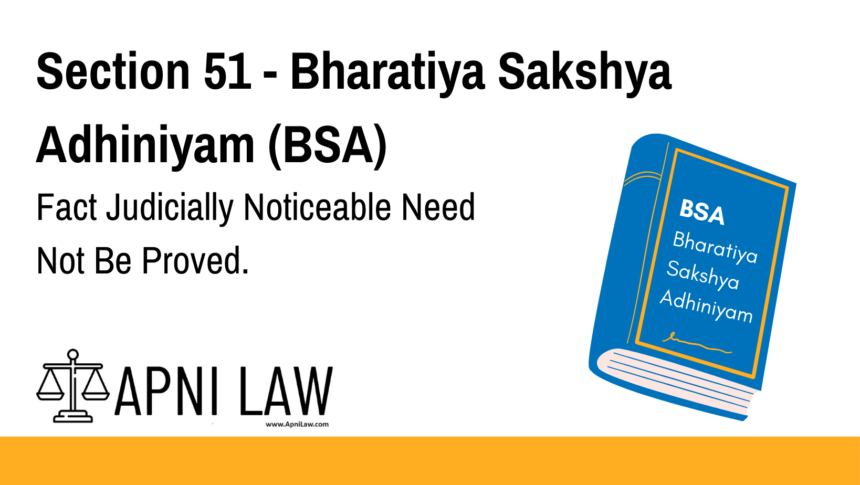Code: Section 51 – Bharatiya Sakshya Adhiniyam (BSA)
❝No fact of which the Court will take judicial notice need be proved.❞
Explanation of Section 51 BSA
Section 51 of the Bharatiya Sakshya Adhiniyam, 2023, provides a critical evidentiary principle: if the Court is empowered to take judicial notice of a fact, that fact does not require formal proof during a legal proceeding.
Judicial notice refers to the Court’s acceptance of certain facts as universally known, established, or indisputable—facts that don’t need to be proven with evidence because they are either:
-
Common knowledge,
-
Already documented by law, or
-
Officially recorded or published by competent authorities.
This section simplifies and expedites the judicial process by eliminating the need for unnecessary evidence on matters the Court already recognizes.
Key Features:
-
No need to present evidence for judicially noticeable facts.
-
Applicable in both civil and criminal proceedings.
-
Enhances procedural efficiency and avoids redundant documentation.
Illustration
Example 1: Calendar Date
In a theft case, the prosecution refers to 15th August as India’s Independence Day. The Court takes judicial notice of this date and does not require proof.
Example 2: Official Gazette Notification
A party refers to a notification published in the Official Gazette by the Central Government. The Court can take judicial notice of this without requiring formal submission of the entire gazette document.
Common Questions and Answers on Section 51 BSA
1. What is judicial notice under Indian evidence law?
Judicial notice refers to the Court recognizing certain facts as true without requiring formal proof—such as historical dates, laws, or geographical facts.
2. What kind of facts can be judicially noticed?
Facts that are:
-
Of common knowledge,
-
Part of national history,
-
Found in official government publications,
-
Related to natural events (e.g., sunrise/sunset times),
-
Recognized by statute.
3. Is this applicable in both civil and criminal courts?
Yes. Section 51 applies broadly across legal proceedings in all Indian courts governed by the Bharatiya Sakshya Adhiniyam.
4. Is judicial notice automatic?
Not always. Courts may take judicial notice on their own or upon request by a party if the fact qualifies under the legal criteria.
Related Sections
Conclusion
Section 51 of the Bharatiya Sakshya Adhiniyam streamlines courtroom proceedings by removing the burden of proving facts that courts are bound to accept under judicial notice. It helps ensure efficiency, avoids unnecessary litigation delays, and maintains focus on contested issues.
For more insights and complete legal guides, visit 🔗 ApniLaw – India’s legal learning hub.








